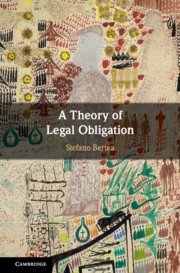Book contents
- A Theory of Legal Obligation
- A Theory of Legal Obligation
- Copyright page
- Dedication
- Contents
- Acknowledgements
- Introduction
- 1 The Concept of Obligation
- 2 Contemporary Approaches to Legal Obligation
- 3 The Social Practice Account
- 4 The Interpretivist Account
- 5 The Conventionalist Reason Account
- 6 The Exclusionary Reason Account
- 7 A Revisionary Kantian Conception
- 8 Further Dimensions of the Revisionary Kantian Conception
- 9 The Robust Reason Account
- 10 The Method of Presuppositional Interpretation
- Conclusion
- Index
2 - Contemporary Approaches to Legal Obligation
A Preliminary Map
Published online by Cambridge University Press: 20 September 2019
- A Theory of Legal Obligation
- A Theory of Legal Obligation
- Copyright page
- Dedication
- Contents
- Acknowledgements
- Introduction
- 1 The Concept of Obligation
- 2 Contemporary Approaches to Legal Obligation
- 3 The Social Practice Account
- 4 The Interpretivist Account
- 5 The Conventionalist Reason Account
- 6 The Exclusionary Reason Account
- 7 A Revisionary Kantian Conception
- 8 Further Dimensions of the Revisionary Kantian Conception
- 9 The Robust Reason Account
- 10 The Method of Presuppositional Interpretation
- Conclusion
- Index
Summary
Chapter 2 discusses the existing theories of legal obligation. Here I introduce a basic distinction between approaches to legal obligation, or paradigms for an understanding of it: the distinction between the ‘empirical model’ (with its main variants consisting in the ‘predictive account’ and ‘imperatival account’) and the ‘normative model’ (which comes in different versions, irreducible one to another, the most significant of which are the ‘formal account’, the ‘social practice account’, the ‘interpretivist account’, and the ‘reason account’). I will also defend the view that, without too much oversimplification, the basic conceptions of legal obligation advocated in jurisprudence today can be reduced to those two paradigms. However, I will go on to claim, only the normative model offers a presumptively sound interpretation of the kind of obligation engendered by law.
Keywords
- Type
- Chapter
- Information
- A Theory of Legal Obligation , pp. 43 - 73Publisher: Cambridge University PressPrint publication year: 2019

